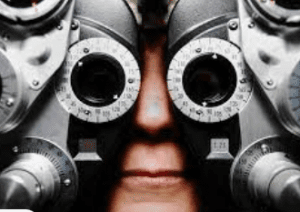Patient Education
This article is tailored for patients. Refer your patients to this article for them to learn more about their condition.
Why Vision Screening is Important
At least 2.2 billion people across the world have visual impairment

Are you wondering how you can ease your eye strain? Or are you someone who tends to disregard any discrepancies you experience with your vision?
According to the World Health Organization (WHO), visual impairment is not just common among senior citizens. Even kids, teenagers, and young adults can suffer from different types of eye disorders. In fact, uncorrected refractive errors are said to be one of the most common causes of eye impairment.
Ideally, one shouldn’t wait until they have serious complications with their eyesight before they consider vision screening. As they say, prevention is better than cure.
What is Vision Screening?
Vision screening involves a quick exam designed to help determine whether a child has eye disorders or is on the verge of developing one. It is also referred to as an eye test. Adults may also undergo an eye test. Ideally, a person must have their vision screened periodically.
People younger than 40 should have their eyes checked every 5 to 10 years. Those aged 40 to 54 should be screened every 2 to 4 years, while older people aged 55 to 64 must take an eye test every 1 to 3 years. If a person is aged 65 or older, then a vision screening every 1 to 2 years is recommended.
What happens in a typical eye test?
There are three types of tests in a vision screening, and these are:
- Test to check distance vision— This is usually done with children. They are made to stand at a distance of 20 feet from a specific chart. This particular chart contains letters arranged in multiple rows. The letters at the top row are significantly bigger and bolder than the ones in the lower rows. The child will then read the letters out loud one by one in descending order, with one eye closed. The test will be repeated with the initially closed eye now open and the other eye used to read the letters closed.
- Test to check close-up vision— In this test, there are small cards each with a text on them. The cards will be held at a closer distance and the person will be made to read the contents of each card. Unlike in a distance vision test, tests for close-up vision are done with both eyes open. This test is typically done for older adults because eyesight at closer distances tends to be impaired as a person matures.
- Test to check color blindness—The child or person will be presented with cards that bear several dots in different colors. However, within these dots, there are symbols hidden or formed in the background. The patient will then be asked to try and read the symbol concealed within the multicolored dots.
Why is Vision Screening Important?
Vision screening is essential because it primarily aids in the detection of possible visual impairments early on. At the same time, it helps adults in assessing whether they need to wear corrective glasses or should undergo a specific type of procedure to improve their eyesight.
There are several more benefits that regular visual screening can provide:
- It helps determine the underlying causes behind mild to serious eye conditions. At times, visual impairment may be the result of genetics, vitamin deficiency, accidents or head trauma, or it may also be due to habits or lifestyle choices that are detrimental to one’s eye health. It is important to determine what has caused eye defects on each individual to ensure that they are given appropriate interventions and medication.
- It enables work from home employees to maintain eye health. Most of the time, employees working from home tend to work longer hours. They also suffer from the effects of extended exposure to blue lights. Hence, their eyes are more strained and their vision becomes compromised at a faster rate. By undergoing regular vision screenings, they can be alerted on whether they need to wear corrective lenses or adjust their schedule and work routine to give their eyes time to rest.
- It protects the eyesight of children. One of the main reasons why vision screening is highly recommended at an early age is because disorders involving a person’s eyesight are best diagnosed and treated while they are young. Discrepancies with how a child’s vision center processes and sends clear and recognizable images to the brain is a serious matter that must be addressed promptly. Otherwise, it could affect the child’s learning and development. It may even leave serious repercussions on their mental and emotional well-being. That said, by screening their eyesight while their vision center is still at its developmental stage, doctors can recommend treatments and preventive measures to correct the child’s vision.
- It promotes awareness on the importance of maintaining good eyesight. An impaired vision leaves a ripple effect of inconveniences to any person, whether they are a child, an adult, or an elderly. It becomes difficult to read signs nearby and from afar. You will also have trouble recognizing friends and relatives as you walk down the street, potentially causing misunderstandings. Daily routines such as eating, reading, schoolwork, and fulfilling your job becomes more challenging to complete. Not to mention, contacts can get lost easily while eyeglasses can be easily misplaced. Visual screening makes people more aware and responsible for the overall health of their eyes.
Vision screening is one of the best methods of protecting your eyes. Without a fully functioning pair of eyes, life becomes more difficult, and quite frankly, it will also take a toll on your wallet since more serious eye treatments cost more.
Let this blog serve as your reminder to take good care of your eyes!
